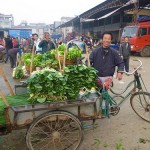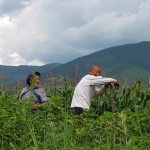For four decades, the longstanding collaboration between the United States Agency for International Development (USAID) and the International Food Policy Research Institute (IFPRI) has been crucial to helping developing countries attain agriculture-led economic growth. The innovative programs and strong evidence base produced through this partnership have contributed to transforming policies and investments for improved food >> Read more
Addressing Food Safety in China and Food Security in the World
At IFPRI's 40th Anniversary celebration, Professor and Honorary Dean of the National School of Development, Peking University in China, Justin Yifu Lin, provided some insights on China's economic growth and its impact on food security and food safety. He also shared the vital role IFPRI plays in ensuring food security.
Reviewing the Reform Experience
Working with leading experts on the reform era who are well informed about the internal processes and logic that drove the reform movement, IFPRI explored China’s economic growth.
Industrialization in China and Africa
The business model called “clustering” involves small businesses that are part of the same industry banding together to specialize in one narrowly defined stage of production. An IFPRI research team completed a study involving four in-depth case studies in China on the subject.
HarvestPlus China
Using innovative ways to fight this “hidden hunger,” HarvestPlus-China contributes to knowledge and technology transfers across research institutions and implementing agencies in both developed and developing countries.
China Strategy Support Program and the International Center for Agricultural and Rural Development
Chinese policymakers are increasingly learning from other international development actors and sharing their own experiences as they design agriculture strategies and poverty-reducing programs. To enhance these collaborations and meet government demand for policy-relevant knowledge, IFPRI launched its China Strategy Support Program in 1996 and subsequently established the International Center for Agricultural and Rural Development (ICARD) in 2003 together with the Chinese Academy of Agricultural Sciences.



